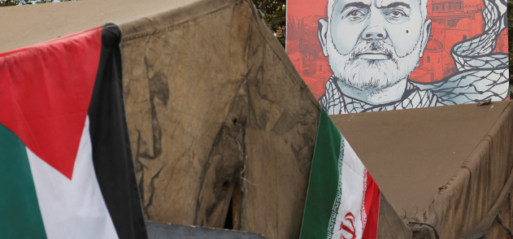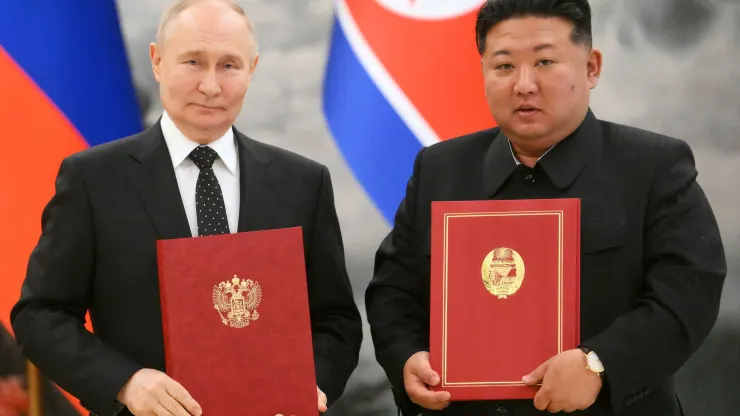TEHRAN – On August 13, Iran rejected calls from Western countries to back down from its threat of retaliation against Israel for the assassination of Hamas political leader Ismail Haniyeh in Tehran at the end of last month.
Iran and its allies have accused Israel of responsibility for Haniyeh’s killing on July 31, which occurred while he was in Tehran for the inauguration of President Masoud Pezeshkian. Israel has not issued a statement on the matter.
Iran has vowed to avenge Haniyeh’s death, which came shortly after an Israeli airstrike in Beirut killed a senior Hezbollah commander, a group supported by Iran.
Western diplomats are working to prevent further escalation in the Middle East, where tensions are already high due to the ongoing Israel-Hamas conflict in Gaza.
On August 12, the United States and its European allies urged Iran to de-escalate. The White House warned of the possibility of a “significant set of attacks” by Iran and its allies as early as this week, with Israel reportedly sharing the same assessment. In response, the United States has deployed a naval strike group and a guided missile submarine to the region to support Israel.
Iran’s Foreign Ministry spokesman, Nasser Kanani, criticized the Western calls for restraint.
“The statement by France, Germany, and Britain, which failed to condemn the Zionist regime’s international crimes, shamelessly asks Iran to refrain from taking deterrent action against a regime that has violated its sovereignty and territorial integrity,” Kanani said.
The U.S. and its European allies have also called for a ceasefire between Israel and Hamas in Gaza, with challenging talks scheduled for August 15 to try to halt the conflict.
The war in Gaza began on October 7 when Hamas launched an attack on southern Israel, resulting in the deaths of 1,198 people, mostly civilians, according to an AFP tally of Israeli official figures. Additionally, militants captured 251 people, of whom 111 remain held captive in Gaza, including 39 who are believed to be dead.
Israel’s retaliatory offensive in Gaza has resulted in at least 39,929 deaths, according to the territory’s health ministry, though it does not distinguish between civilian and militant casualties.
International mediators have invited Israel and Hamas to resume ceasefire negotiations and discuss a hostage release deal, which Israel has agreed to.
However, far-right parties within Prime Minister Benjamin Netanyahu’s ruling coalition strongly oppose any ceasefire in Gaza. This stance was highlighted by National Security Minister Itamar Ben-Gvir during a visit to Jerusalem’s Al-Aqsa Mosque compound, which Jordan, the site’s custodian, swiftly condemned.
Defying established rules that allow non-Muslims to visit but not pray at the compound, Ben-Gvir led hundreds of Israelis in singing Jewish hymns and performing Talmudic rituals, as shown in social media videos. In a video filmed within the compound, Ben-Gvir reiterated his opposition to any ceasefire in Gaza.
“We must win and not engage in talks in Doha or Cairo,” he said, referring to the truce discussions planned for August 15.
Netanyahu’s office stated that Ben-Gvir’s visit “deviated from the status quo” but affirmed that Israel’s policy on the Temple Mount remains unchanged.
Hamas has called on mediators to implement a truce plan previously presented by U.S. President Joe Biden rather than holding more talks.
Analyst Esfandyar Batmanghelidj suggested that Iran is considering how to retaliate against Israel without disrupting the ongoing ceasefire talks.
“The renewed push for a ceasefire offers Iran a way out of this cycle of escalation,” Batmanghelidj, CEO of the Bourse and Bazaar Foundation think-tank, told AFP. “Iranian officials still feel compelled to respond to Israel, but they need to do so in a manner that doesn’t undermine the ceasefire prospects.”
Pressure for a ceasefire in Gaza has increased since emergency services in the Hamas-run territory reported that an Israeli airstrike on August 10 killed 93 people at a school housing displaced Palestinians. Israel claimed it targeted militants operating from the school and a nearby mosque.
In the latest violence in Gaza, an Israeli strike killed 10 members of a single family in the southern district of Khan Younis, leaving only one survivor—a three-month-old girl—according to a medic at Nasser Hospital.
“Ten members of the Abu Haya family were killed in an Israeli strike on Abassan in east Khan Younis,” said the medic, who wished to remain anonymous. “There is only one survivor from the family, a baby girl named Rim. She is just three months old.”
The sight of the girl, wrapped in a black cloth, stirred strong emotions in the courtyard of Nasser Hospital, where grieving families search for dead or injured loved ones.
“This little girl was pulled out of the rubble. Her whole family is dead. Who will take care of her now?” asked Khan Younis resident Ibrahim Barbakh, who was holding the baby. AFP.





